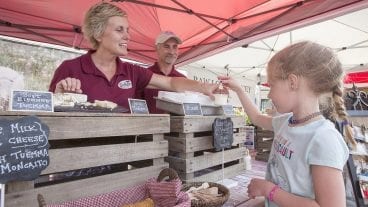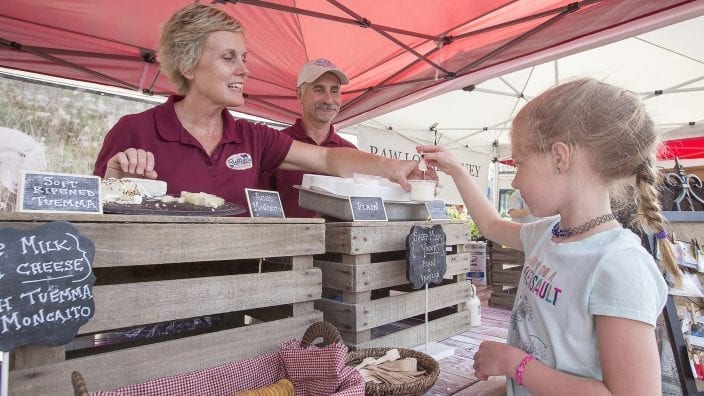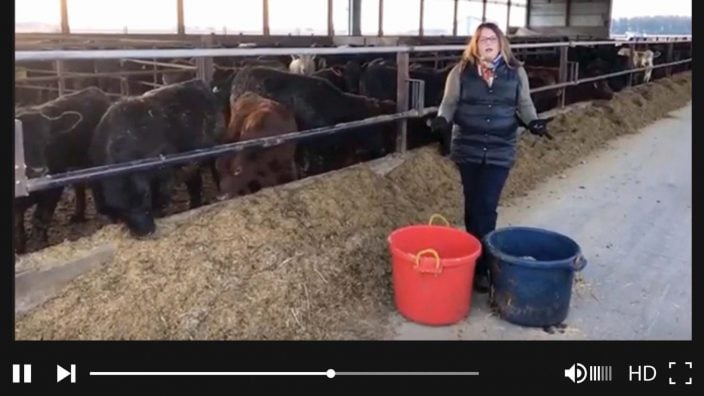Farmer’s Guide to Trucking Regulations available to Ohio Farm Bureau members
The guide includes a farm driver checklist, overview of state and federal regulations and exemptions, CDL qualifications and more.
Read More
Surrounded by a herd of black Angus cattle in the feedlot of the family farm, Erin Stickel is all business as she details the intricacies of raising beef for an Ohio high school class studying animal and plant science.
And while the students can hear the cows mooing and see Stickel in the barn with her boots covered in manure and straw, they’re comfortably seated in their Sidney High School classroom as they learn what the cattle eat, how they’re bred and how they fit into the life cycle of the Stickel farm in northwest Ohio.
Stickel is hosting a virtual farm tour, one of more than 100 held over the past five years through a partnership between farmers, commodity organizations and Shift•ology Communication of Springfield.
Shift•ology organizes the tours and provides the technology while farmers give the tours via video conferencing. Commodity groups like the Ohio Pork Council, the Ohio Beef Council and the Ohio Soybean Council help promote and pay for the tours, line up farmers to do the tours and provide moderators for each tour.
“They’re as close as you can get without actually stepping on a farm,” said Dan Toland, Shift•ology’s virtual farm trip manager. “We focus on live, unscripted, highly engaging trips.”
Virtual farm trips emerged several years ago when money for school field trips grew scarce and technology became sophisticated and inexpensive enough so that tours could be easily live-streamed from farms to video screens in classrooms.
Thousands of students can watch a single tour and, depending on how many are participating, can ask questions directly through the live stream or by message, Toland said. The tours are free for students, who range from elementary to high school.
“It’s a great way for farmers to show what they do,” Toland said. “There’s no agenda or talking points, just the farmer sharing what they’re doing.”
Stickel, a Wood County Farm Bureau member, has been a virtual tour guide on her husband’s family farm for two years.
“We believe in offering opportunities for people to see, touch and smell the things that production agriculture can provide, and we open our farm up to various groups,” said Stickel, who grew up on a nearby farm. “The goal is for students to see and hear what happens on a cattle operation, for kids to have an appreciation for the practices and sustainability of the production process. There’s a whole supply chain behind where food comes from and it’s important that kids appreciate all that goes into keeping food in their bellies.”
Kayla Jones, Farm Bureau organization director for Knox, Holmes, Licking and Coshocton counties, has encouraged virtual farm tours within her area for the last few years.
“We start with a teacher or group of teachers that are interested in working a virtual field trip into their curriculum,” she said. “Then we have a group of farmers we contact who are willing to participate. What it takes is a solid internet connection, a bluetooth headset and an iPad.”
Two-way access to the students during the tour is essential, she said, so they can ask questions in real time. The tour generally takes less than an hour.
Jones said virtual farm field trips are especially ideal for farmers who would generally not host on-site field trips, such as those with bio-security requirements.
“Those virtual field trips are important because students just don’t know what happens on those farms because they aren’t allowed to see it,” Jones said. “If we don’t take the time to show them, someone else will tell them and it might not be true. Getting the truth out there about what it’s really like is what’s most important.”
During her recent tour, Stickel talked about how the cows on their farm are bred (naturally), calving arrangements (they’re moved into a calving barn before the birth) and what they’re fed (a mix that includes distiller’s grain, soybean meal and bakery byproducts).
Teacher Michael Ward asks how the feedlot is kept environmentally sound. Stickel explains that the space has great circulation and the herd is small enough that farm staff can check it each day and quickly find sick animals.
Naturally, Stickel also has a few words to say about the manure the herd produces, noting that it’s “supercritical” to the farm’s bottom line and has cut their use of fertilizer by 80% in recent years.
“Cattle don’t stop pooping every day,” she said, so the farm has a manure holding area for any excess that can’t be used immediately.
For Stickel, the tours have been an opportunity to help educate children about farming and demystify agriculture. And they’re held rain or shine.
“Last year it was disgusting one day — 35 degrees and raining — and I told the students that this is real life, that it gets a little sloppy in the barn and that’s just the reality. Some days you have to deal with a little bit more mud than others.”


The guide includes a farm driver checklist, overview of state and federal regulations and exemptions, CDL qualifications and more.
Read More


Ohio Farm Bureau provides opportunities, platforms and resources to help you develop your voice in the industry and give farmers a seat at the table with leaders and legislators.
Read More

The emergency fuel waiver to allow the sale of summer gasoline blends containing 15% ethanol will lengthen the period during which Americans can continue buying E15 from June 1 to Sept. 15.
Read More

The Small-Scale Food Business Guide covers federal and state regulations for selling food products such as raw meat, dairy, eggs, baked goods, cottage foods, fruits and vegetables, honey and more.
Read More

New resources and technology are broadening the different types of sales tools and strategies available to farmers.
Read More

ODA will enroll 500,000 acres into the program for a two-week sign-up period, beginning April 22, 2024, through May 6, 2024. Contact local SWCD offices to apply.
Read More

Katie Share of Columbus has been named ExploreAg and Youth Development Specialist for Ohio Farm Bureau.
Read More

Mary Klopfenstein of Delphos has been named Young Ag Professional and Ag Literacy Program Specialist for Ohio Farm Bureau.
Read More

The plan has been updated to give sole proprietors access to more rate stability and a smart solution that offers potential savings on health care.
Read More

The American Farm Bureau Federation, in partnership with Farm Credit, is seeking entrepreneurs to apply online by June 15 for the 2025 Farm Bureau Ag Innovation Challenge.
Read More